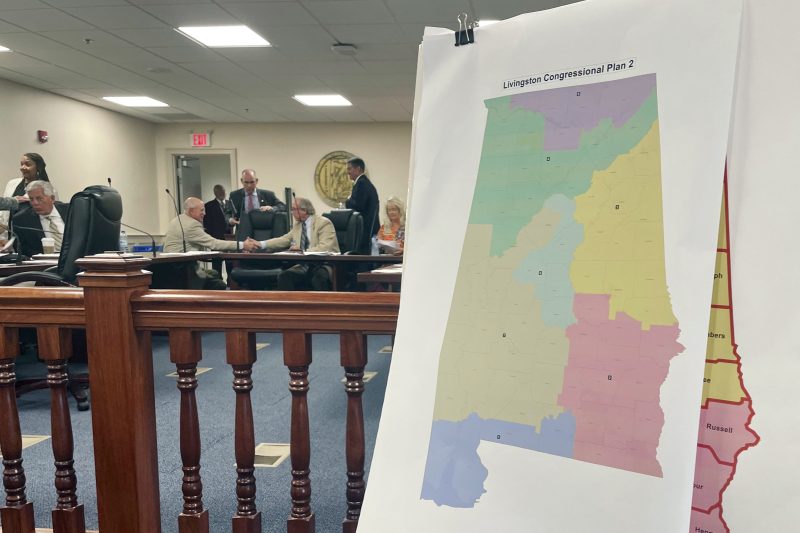A panel of three federal judges on Thursday chose a new Alabama congressional map that maintains a Black-majority district in the state and establishes another near-Black-majority district that could flip a House seat for Democrats in 2024.
Thursday’s decision is the latest in a long legal battle that pitted Alabama’s GOP-led legislature against Democrats and civil rights groups that argued that Republicans were illegally diluting the power of Black voters in the state. About 27 percent of the state’s voting population is Black.
In the map chosen Thursday, the state’s 2nd Congressional District has a Black voting-age population of 48.7 percent, and its 7th District maintains its Black majority with a Black voting-age population of 51.9 percent.
Top Republican elected officials in the state indicated that they will use the map during the 2024 election cycle, but that future legal challenges are expected.
Alabama Secretary of State Wes Allen (R) said in a statement that his office “will facilitate the 2024 election cycle in accordance with the map the federal court has forced upon Alabama and ordered us to use.” But he also said that “the legal portion of this process has not yet been completed.”
“A full hearing on the redistricting issue will take place in the future and I trust [Alabama] Attorney General [Steve] Marshall to represent Alabama through that process,” he said.
In a statement, Marshall said that the state will abide by the court’s order for the 2024 elections and expects to “continue to defend the State’s law in court for future elections.”
The case has been closely watched because of an array of challenges to congressional maps advancing in courts throughout the country that could give one political party or the other an advantage heading into the 2024 elections.
The U.S. Supreme Court ruled in June that Alabama’s congressional map did not comply with the Voting Rights Act, because it unlawfully diluted the political power of Black residents.
The decision upheld the federal panel’s earlier ruling. Alabama’s legislature was subsequently tasked with redrawing its congressional map boundaries.
After the legislature redrew the map in July and it was signed into law by Gov. Kay Ivey (R), the same federal panel of judges found again that it did not comply with the Voting Rights Act.
Instead of tasking the conservative state legislature with redrawing the maps again, the federal panel directed a special master and cartographer to create three proposed remedial maps to be filed by Sept. 25.
“We do not take lightly federal intrusion into a process ordinarily reserved for the State Legislature. But we have now said twice that this Voting Rights Act case is not close,” the judges wrote in the order then. “And we are deeply troubled that the State enacted a map that the State readily admits does not provide the remedy we said federal law requires.”
Late last month, the state of Alabama again tried to escalate the matter to the conservative-leaning U.S. Supreme Court. The Supreme Court for a second time refused Alabama’s attempt to hold the 2024 elections under a new congressional map judged to be an unlawful attempt to diminish the power of the state’s Black voters.
The map put forward Thursday retains 86.9 percent of Alabamians in their district under the plan signed into law by Ivey this summer, the panel’s order states.
Democratic Party groups and voting rights advocacy groups involved in the case celebrated Thursday’s decision.
JaTaune Bosby Gilchrist, executive director of the American Civil Liberties Union of Alabama, which was involved in the legal battle over the congressional map, said in a statement that the court’s order “means for the first time, Black voters in two congressional districts will have an opportunity to elect a candidate of their choice.”
Former U.S. attorney general Eric Holder, who served in the Obama administration, said that other states in the midst of similar litigation should take note.
“Other states with pending … cases should view this map, and this process, as both an example of basic fairness and a warning that denying equal representation to Black voters, violating the Voting Rights Act, and defying federal court orders is a direct tie to an odious past and will no longer be tolerated,” Holder said in a statement issued by the National Redistricting Foundation, which backed litigation in the matter.
Rep. Suzan DelBene (D-Wash.), chair of the Democratic Congressional Campaign Committee, called the court’s map selection “a victory for democracy and the state’s Black communities.”
“Today’s decision affirms that Alabama will no longer have a map that dilutes the voting strength of Black citizens, but rather one that reflects the diversity of the state and ensures every community’s voice is heard in Congress,” she added.
Robert Barnes contributed to this report.








